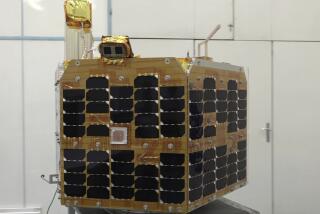Space Launch a Boost to China and Jiang’s Legacy
- Share via
BEIJING — It was a small step in China’s manned space program but a giant leap in the Chinese president’s quest for a place in history.
Flanked by army officers, with a broad grin on his face, President Jiang Zemin watched proudly Monday night as China fired the third in a series of unmanned test capsules into orbit.
“Comrades, the launch of the Shenzhou III spaceship was a success!” Jiang said after a Long March 2-F rocket carried the craft into orbit. “This is a new milestone in the development of our aerospace industry. I, like everyone, am very happy.”
Jiang’s attendance at the launch was a sign of his Communist government’s growing confidence in the viability of its ambitious decade-old program.
China hopes to join Russia and the United States as the only nations to have sent people into space, and it says it aims eventually to have a permanently staffed space station.
“Manned spaceflight is just the first step,” the official New China News Agency quoted Jiang as saying.
Although a manned launch may not come before Jiang’s expected retirement as head of the Communist Party this fall and as president next year, success could boost the 75-year-old leader’s drive to be enshrined in Chinese history alongside Mao Tse-tung and Deng Xiaoping.
State television devoted considerable portions of its midday and evening national news broadcasts to Jiang’s visit to the Jiuquan launch center, near where the Great Wall ends in the desert of northern China’s Gansu province.
Underscoring the Chinese army’s heavy role in the secretive manned program, code-named Project 921, Jiang wore a green military-style suit. He delivered a speech against a backdrop of images of the red Chinese flag and firework-festooned Tiananmen Gate that overlooks Beijing’s famed square.
The launch “greatly boosted the whole nation’s morale,” Jiang told army officers and engineers he met Tuesday during an inspection of the launch center.
It “shows that the Chinese people are perfectly capable of understanding the most advanced technologies by making their own innovations and can be part of the high-tech world,” Jiang said.
China has not said when its first “taikonauts,” coined from the Chinese word for outer space, will blast into orbit.
But the news agency said the Shenzhou III vessel “can carry out all the functions of a manned craft” and was carrying “dummy astronauts” as well as instruments to simulate and monitor human vital signs. Data gathered would be used to improve life-support systems on future craft, it said.
Scientists for the first time also tested an emergency escape system for astronauts during the launch, state media said.
More to Read
Sign up for Essential California
The most important California stories and recommendations in your inbox every morning.
You may occasionally receive promotional content from the Los Angeles Times.










